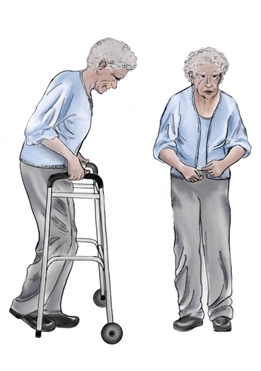Related Research Articles

Dementia is a syndrome associated with many neurodegenerative diseases, characterized by a general decline in cognitive abilities that affects a person's ability to perform everyday activities. This typically involves problems with memory, thinking, behavior, and motor control. Aside from memory impairment and a disruption in thought patterns, the most common symptoms of dementia include emotional problems, difficulties with language, and decreased motivation. The symptoms may be described as occurring in a continuum over several stages. Dementia ultimately has a significant effect on the individual, their caregivers, and their social relationships in general. A diagnosis of dementia requires the observation of a change from a person's usual mental functioning and a greater cognitive decline than might be caused by the normal aging process.

The Delft University of Technology is the oldest and largest Dutch public technical university, located in Delft, The Netherlands. It specializes in engineering, technology, computing, design, and natural sciences.
Delirium is a specific state of acute confusion attributable to the direct physiological consequence of a medical condition, effects of a psychoactive substance, or multiple causes, which usually develops over the course of hours to days. As a syndrome, delirium presents with disturbances in attention, awareness, and higher-order cognition. People with delirium may experience other neuropsychiatric disturbances, including changes in psychomotor activity, disrupted sleep-wake cycle, emotional disturbances, disturbances of consciousness, or, altered state of consciousness, as well as perceptual disturbances, although these features are not required for diagnosis.
Hypersexuality is a presumed mental disorder that causes unwanted or excessive sexual arousal, causing people to engage in or think about sexual activity to a point of distress or impairment. It is controversial whether it should be included as a clinical diagnosis used by mental healthcare professionals. Nymphomania and satyriasis were terms previously used for the condition in women and men, respectively.

Dementia with Lewy bodies (DLB) is a type of dementia characterized by changes in sleep, behavior, cognition, movement, and regulation of automatic bodily functions. Memory loss is not always an early symptom. The disease worsens over time and is usually diagnosed when cognitive impairment interferes with normal daily functioning. Together with Parkinson's disease dementia, DLB is one of the two Lewy body dementias. It is a common form of dementia, but the prevalence is not known accurately and many diagnoses are missed. The disease was first described on autopsy by Kenji Kosaka in 1976, and he named the condition several years later.
In psychology, alogia is poor thinking inferred from speech and language usage. There may be a general lack of additional, unprompted content seen in normal speech, so replies to questions may be brief and concrete, with less spontaneous speech. This is termed poverty of speech or laconic speech. The amount of speech may be normal but conveys little information because it is vague, empty, stereotyped, overconcrete, overabstract, or repetitive. This is termed poverty of content or poverty of content of speech. Under Scale for the Assessment of Negative Symptoms used in clinical research, thought blocking is considered a part of alogia, and so is increased latency in response.

Apathy, also referred to as indifference, is a lack of feeling, emotion, interest, or concern about something. It is a state of indifference, or the suppression of emotions such as concern, excitement, motivation, or passion. An apathetic individual has an absence of interest in or concern about emotional, social, spiritual, philosophical, virtual, or physical life and the world. Apathy can also be defined as a person's lack of goal orientation. Apathy falls in the less extreme spectrum of diminished motivation, with abulia in the middle and akinetic mutism being more extreme than both apathy and abulia.

Frontotemporal dementia (FTD), also called frontotemporal degeneration disease or frontotemporal neurocognitive disorder, encompasses several types of dementia involving the progressive degeneration of the brain's frontal and temporal lobes. FTD is the second most prevalent type of early onset dementia after Alzheimer's disease. Men and women appear to be equally affected. FTD generally presents as a behavioral or language disorder with gradual onset. Signs and symptoms tend to appear in late adulthood, typically between the ages of 45 and 65, although it can affect people younger or older than this. Currently, no cure or approved symptomatic treatment for FTD exists, although some off-label drugs and behavioral methods are prescribed.
Amotivational syndrome is a chronic psychiatric disorder characterized by signs that are linked to cognitive and emotional states such as detachment, blunted emotion and drives, executive functions like memory and attention, disinterest, passivity, apathy, and a general lack of motivation. This syndrome can be branched into two subtypes - marijuana amotivational syndrome, interchangeably known as cannabis induced amotivational syndrome which is caused by usage and/or dependency of the substance and is primarily associated with long-term effects of cannabis use, and SSRI-induced amotivational syndrome or SSRI-induced apathy caused by the intake of SSRI medication dosage. According to the Handbook of Clinical Psychopharmacology for Therapists, amotivational syndrome is listed as a possible side effect of SSRIs in the treatment of clinical depression.

Anouk Schemmekes, professionally known by the mononym Anouk, is a Dutch singer and songwriter. After her 1997 breakthrough rock single "Nobody's Wife", she had additional hit records in the Dutch and Belgian charts. Many of her albums topped the Dutch album charts, most of them going Platinum and several debuting in the number 1 position. Her most famous singles include "Michel", "It's So Hard", "R U Kiddin' Me", "Girl", "Lost", "Modern World", "Three Days in a Row", "Birds", and "Woman".
As populations age, caring for people with dementia has become more common. Elderly caregiving may consist of formal care and informal care. Formal care involves the services of community and medical partners, while informal care involves the support of family, friends, and local communities. In most mild-to-medium cases of dementia, the caregiver is a spouse or an adult child. Over a period of time, more professional care in the form of nursing and other supportive care may be required medically, whether at home or in a long-term care facility. There is evidence to show that case management can improve care for individuals with dementia and the experience of their caregivers. Furthermore, case management may reduce overall costs and institutional care in the medium term. Millions of people living in the United States take care of a friend or family member with Alzheimer’s disease or a related dementia.

Alzheimer's disease (AD) is a neurodegenerative disease that usually starts slowly and progressively worsens, and is the cause of 60–70% of cases of dementia. The most common early symptom is difficulty in remembering recent events. As the disease advances, symptoms can include problems with language, disorientation, mood swings, loss of motivation, self-neglect, and behavioral issues. As a person's condition declines, they often withdraw from family and society. Gradually, bodily functions are lost, ultimately leading to death. Although the speed of progression can vary, the average life expectancy following diagnosis is three to twelve years.

Parkinson's disease (PD), or simply Parkinson's, is a long-term neurodegenerative disease of mainly the central nervous system that affects both the motor and non-motor systems of the body. The symptoms usually emerge slowly, and as the disease progresses, non-motor symptoms become more common. Usual symptoms include tremors, slowness of movement, rigidity, and difficulty with balance, collectively known as parkinsonism. Parkinson's disease dementia, falls and neuropsychiatric problems such as sleep abnormalities, psychosis, mood swings, or behavioral changes may arise in advanced stages as well.

Signs and symptoms of Parkinson's disease are varied. Parkinson's disease affects movement, producing motor symptoms. Non-motor symptoms, which include dysautonomia, cognitive and neurobehavioral problems, and sensory and sleep difficulties, are also common. When other diseases mimic Parkinson's disease, they are categorized as parkinsonism.

The Dutch Game Garden is a video game studio incubator which was launched in Utrecht, The Netherlands in 2008 using funding from the European Regional Development Fund. The organisation is the largest such program in the Netherlands.

Coen Verbraak is a Dutch journalist and television producer and presenter.
The relationships between digital media use and mental health have been investigated by various researchers—predominantly psychologists, sociologists, anthropologists, and medical experts—especially since the mid-1990s, after the growth of the World Wide Web and rise of text messaging. A significant body of research has explored "overuse" phenomena, commonly known as "digital addictions", or "digital dependencies". These phenomena manifest differently in many societies and cultures. Some experts have investigated the benefits of moderate digital media use in various domains, including in mental health, and the treatment of mental health problems with novel technological solutions.
Noa Pothoven was a Dutch mental health activist and author. Her death at the age of 17 sparked global controversy due to public statements she made about her wish to die, her activism concerning youth mental health care, and foreign media reports that incorrectly attributed her eventual death to active euthanasia. Many foreign news outlets wrongfully stated Pothoven was euthanised under the Dutch 2001 Termination of Life on Request and Assisted Suicide Act.

Tim Hofman is a Dutch television presenter, journalist, poet, and columnist. Hofman often worked under the pseudonym debroervanroos. He is among other things known as the presenter of the online program #BOOS, with which he has won various awards.
Cegeka is a European provider of IT solutions, services and consultancy. The company was founded in 1992 and has data centers in Hasselt, Belgium and Geleen, the Netherlands. Anno 2020 CEO Stijn Bijnens leads the company from its headquarters in Hasselt. In 2020, the group had 5,000 employees and achieved a consolidated turnover of 640 million euros.
References
- ↑ Beaton, Fiona (31 July 2021). "Technology-based non-pharmacological interventions for stress and distress in dementia care: a systematic review; and, A mixed-method multiple-baseline single-case study exploring the impact of the Tovertafel (Magic Table) on factors impacting staff burnout in an acute dementia care hospital ward". University of Edinburgh. doi:10.7488/era/995 . Retrieved 22 May 2022.
{{cite journal}}: Cite journal requires|journal=(help) - 1 2 3 4 Mannion, Eleanor (2 September 2019). New library 'magic tables' helping people with dementia, autism (Radio). Morning Ireland . RTÉ Radio 1 . Retrieved 2 September 2019– via RTÉ Radio Player.
- ↑ "Evaluation of the Effectiveness of the TOVERTAFEL System on Behavioral Disorders of People With Cognitive Disorders Hospitalized in Long-Term Care Units and in Reinforced Hosting Unit". clinicaltrials.gov. 12 July 2021. Retrieved 22 May 2022.
- ↑ "'Magic table' helping dementia patients". BBC News.
- 1 2 "Active Cues – Tovertafel" (in Dutch). Archived from the original on 2 September 2019. Retrieved 2 September 2019.
- ↑ Gorecki, Jessica (19 August 2019). "Tovertafel – Digitale Spiele sollen Demenz-Patienten in Flensburg helfen" [Tovertafel – Digital games help dementia patients in Flensburg]. Flensburger Tageblatt (in German). Flensburg. Archived from the original on 2 September 2019. Retrieved 2 September 2019– via SHZ.de.
- ↑ Anderiesen, H. (September 2, 2017). Playful Design for Activation: Co-designing serious games for people with moderate to severe dementia to reduce apathy (Thesis). Delft University of Technology. doi:10.4233/uuid:ebeef0fa-46fe-4947-86c1-c765a583770a – via repository.tudelft.nl.
- ↑ "Our Impact". Dutch Game Garden.
- ↑ "Prijzen Dutch game awards".
- ↑ "Active Cues wint Boer & Croon Co-generation Award 2015!". Boer & Croon. January 21, 2016.
- ↑ "De New Venture winnaars van 2014 – 2015 zijn Active Cues, Bedrijfsoorcheck en PowerWindow". June 25, 2015.
- ↑ "lab-kent-vijf-winnaars.html Prijzen PwC Social Impact Lab".
- ↑ "Nederlandse scaleup Active Cues wint EIT Digital Challenge 2018". EIT Digital.
- ↑ "EY – Bekendmaking nominaties beste ondernemer van het jaar 2018 – EY – Nederland".